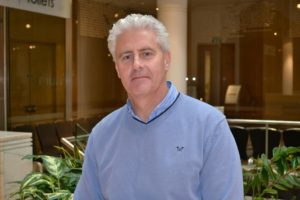Martin Hunt
BioLeaders Interview – Martin Hunt (February 2020)

I have 30 years’ experience in the life science industry has spanned executive and NED roles in multi-nationals, SMEs and public companies. During 15 years in international Medtech companies, I had senior roles in sectors including ophthalmic surgery, wound management and chronic care. I joined Tissue Science Laboratories (TSL) as Chief Executive in 1999 and led the company from angel funding as a start-up, to a listing on the AiM market in 2001 through to trade sale to Covidien in 2008.
Since then, I have pursued a portfolio career, including Chair or NED on the Boards of nine early stage Medtech, Biotech and Diagnostic companies. I am currently Chair of two, with technologies in regenerative medicine and skin microbiome, and Programme Director for the NIHR.
i4i NIHR Invention for Innovation, a translational funding programme, aims to support and advance the research and development of innovative healthcare technologies and their translation into the clinical environment for the benefit of patients. The programme has a current portfolio of c£120m invested in 170+ projects and has leveraged additional funding of over £94m. I am also a member of the NIHR Strategy Board.
I have raised over £50m public / private funding to support innovative technologies and I am an active business angel.
Key milestones in your career journey to date?
I seem to have found myself in ‘the right place at the right time’ from my early career onwards, with champions who believed in me! Becoming Storz Ophthalmics UK Business Manager was my first senior management role which proved to be a springboard for my career. VP Sales, Europe at ConvaTec gave me excellent international management experience and ultimately led to my CEO role and the opportunity to lead the growth, float and trade sale of TSL. This has enabled me to pursue a varied and rewarding portfolio career for over a decade, working with innovative science, technology and outstanding people.
Who has had the greatest influence over your career?
My champions have included:
- Jeff Ashpitz who took me under his wing at American Cyanamid and steered my early career at Storz Ophthalmics.
- Patrick Paul, my Chairman at TSL, who gave me the space, confidence and support to be a CEO.
- Professor Dame Sally Davies, the inspirational head of the NIHR who supported me in developing the remit and evolution of the NIHR i4i programme.
Your approach to spotting and developing top talent?
Where possible, over hire ‘high potentials’ to harness their intellectual horsepower to accelerate company growth; give talent the space to grow, releasing that self believe through empowerment which is always the most important form of personal development.
What attributes make an outstanding leader in today’s world?
Remain calm under fire; patience and pragmatism; demonstrate a strong work ethic; cultivate creativity and productivity; inspire from a distance through passion and a leap of trust.
What is our industry’s contribution to improving climate change?
Aspects of climate which are debated at the companies I am involved with include:
- How does the industry rebalance the prescription of antibiotics which are too readily available; and the impact they then have on our eco system.
- Making greater use of technology instead of flying.
- How to source, test and dispose of all components to be kinder to the climate.
How do you create a culture of continual learning, innovation and curiosity?
Positive disruption and encourage continual evolution; explore different ways of doing things – don’t be content; radical thinking; it’s OK to fail!
What’s your hidden talent or something that might surprise others about you?
I’m a frustrated drummer! I learnt to play (badly) many years ago and I’m still waiting for my break into the world of rock and roll.
Thoughts on the current funding model for early stage companies?
Continue to raise awareness of the NIHR i4i funding model which now has a portfolio of £144m invested. Strong focus on SMEs – 53% of the funded applications are now led by or include an SME, vs c12% 5 years ago. Early stage companies should focus on public and other “benign” funding sources, and this is especially true for the AI / digital revolution. Using these sources to de-risk the technology greatly aids access to growth capital.
What will be the biggest technological transformation in the industry over the next 5 years?
The impact of AI on diagnosis, interpretation and treatment. Freeing the medical profession to concentrate on the care pathway and the patient by using tools to interpret large data sets, aid diagnosis and improve treatment.
Your views on encouraging volunteering amongst colleagues?
Volunteering is a great leveller; companies should be fully supportive of employees.
Your legacy to the sector?
Through NIHR i4i, the alignment of private and public sectors to harness funding to better translate ground breaking technologies in life sciences; from my portfolio of Board roles since the TSL exit, my contribution to the growth and development of early stage companies using my own experiences, scar tissue, successes and failures!
Your simple philosophy on life?
I am the master of my fate, I am the captain of my soul (with apologies to William Ernest Henley!).
Words of Wisdom?
- Best Advice I was given: Success is the ability to go from one failure to another with no loss of enthusiasm – Churchill (who clearly understood the challenges of the life sciences industry!).
- Advice I’d give: Be courageous and trust your instincts. People are the most disruptive technology.
- What I wish I’d known: It will be huge fun! I will make a difference.
Click here to read more of our BioLeaders interviews.

